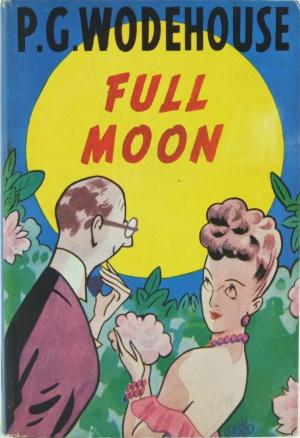
Book Review by George S: November is the Group's comfort reading month, so instinctively I went for a P.G. Wodehouse. I thought Full Moon might be a Blandings I hadn't read - but it wasn't. In fact, it turned out to be one I had read only a few years ago. If anything, though, the book was even better on a re-reading - which might be one definition of comfort reading. Re-reading means you get to truly appreciate the skill with which the book is constructed, the little throwaway things that will return later to add to the farcical complications.
The book is structured round two love plots. Bill is a struggling artist who loves Prudence, but her parents disapprove, so their Registry office wedding is prevented, and she is sent off to Blandings castle. Tipton Plimsoll is a young American millionaire afraid he may be cultivating a drink problem, so he too goes to Blandings, where he meets Veronica Wedge, whose parents are desperate to get her married off to a rich man. The two plots are farcically brought together because Tipton, feeling vulnerable in London, had repeatedly caught sight of Bill's rather ugly mug and thought it may be a hallucination caused by drink. This unlikely (indeed very silly) premise gives rise to a plot that otherwise follows quite logically into complication after complication - diamond necklaces given to the wrong girl, pigs appearing in bedrooms, and so forth. Most of the complications are caused by someone trying to make things better, of course only serving to make them worse.
Entangled in the plot are the usual cast of Blandings characters - Lord Emsworth, who is vague about everything except his pigs; Freddy Threepwood, the silly ass, now with a job selling dog-biscuits; Galahad, the man-about-town from the nineties, who now acts as a sort of fairy-godfather to young people in love; and so on.
Wodehouse's writing method was to produce a detailed scenario of the events that unfold, and then do the actual writing - and this is where the real joy of Wodehouse comes from. He is so good at using the resources of language. One minor example:
Here is the end of the book's first paragraph:
Veronica Wedge [...] Lady Hermione's outstandingly beautiful daughter, [...] was lying in bed staring at the ceiling and wishing she had some decent jewels to wear at the forthcoming County Ball. A lovely girl needs, of course, no jewels but her youth and health and charm, but anybody who had wanted to make Veronica believe that would have had to work like a beaver.
The worthy cliché about lovely girls needing no ornaments is cut down sharply by the introduction of quite another register of language and a decisive change to the rhythm of the sentence. And this is what Wodehouse does throughout, keeping the reader alert by skipping quickly between the languages of romantic fiction, of thrillers, of golf, of racing and gambling, of boxing, of business, of literary quotation and so on. We enjoy a narrative voice in complete command of several registers of language, while laughing at the mostly single- minded characters, who can only manage one each.
It all ends happily, of course, and while the pompous and bossy characters are defeated, there are no hard feelings. Lady Hermione Wedge, the bossiest, is even allowed a small triumph at the end. The mood is sunny throughout. Definitely comfort reading. I've had my flu jab this year, but if disease should strike, this may be a book I shall reach for once again.
It may also have been comfort writing. Most of this book was written after Wodehouse and his wife had been captured by the Germans at Le Touquet in 1940, and sent first to internment camps, and then to Berlin. In a 1941 letter from Berlin to the editor of the Saturday Evening Post, Wodehouse writes:
I have written half of a Blandings novel called Full Moon, so funny that it will be almost dangerous to publish it. The rest is all scenarioed out and I can finish it in a month or so. I don't know why it was, but having to write in pencil in camp seemed to inspire me.
Lord Emsworth and the others are all wonderfully utterly English, and I think one could maybe see this novel as a love-letter to England, written from far away.
